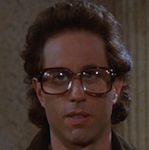|
PeterWeller posted:Kirk learns from his mistakes, though. Not immediately, but people rarely do. At what point in this film does Kirk learn the point of non-interference or ever stop doing whatever he wants to do all the time? Is it the ending speech where he talks about people not always being swayed by their personal desires, right after doing whatever he wanted and then coming back to life because gently caress consequences? Edit: On second thoughts, the reboot's entire version of Captain Kirk is completely hosed. The Kobayashi Maru is originally solved in Wrath of Khan by Kirk through making the Klingons respect the reputation he intended to one day have, which is a pretty interesting way to solve the situation because it means there are zero casualties on any sides. In the reboot Kirk wins because they have no shields so bang bang shooty man I win. That's an interesting way of interpreting Kirk's character that completely defied my expectations, by which I mean loving bullshit I want my money back Abrams. Hbomberguy fucked around with this message at 02:19 on Sep 21, 2013 |
|
|
|

|
| # ? May 16, 2024 15:51 |
|
Hbomberguy posted:Something really irks me about the way STID pays lip service to so many aspects of Star Trek without really doing anything with them. The Prime Directive is referenced and established and then not much is really done with it again and everyone appears to ignore it, Tribbles are there because people know what Tribbles are, that sort of thing. Maybe I'm missing some deep and intricate sociological study where the point is everyone's ignoring the prime directive, but in a movie so on-the-nose with the rest of its plot I'd rather have seen the idea of the Prime Directive go somewhere rather than form the basis for the opening and then never get used again. The opening scene fits in fine with the biblical/christological imagery that pervades the film. This is a series that gave us the Genesis Weapon, after all. Star Trek 2009 is a very old-testament film that ended with the heroes dispensing the wrath of god. Kirk is explicitly "playing god" in this film, not yet responsible enough to wield that power consistently. The idea of people messing around with 'inferior' cultures obviously comes back with Khan's attacks on the Klingons and then on the San Franciscans. The specific plot point doesn't recur, but the imagery of people staring up in awe and terror totally does. So does the conflict between 'saving your crew' and 'saving everyone', which finds its culmination in Khan killing millions out of revenge for a few dozen. The christological lesson is of course that Kirk must sacrifice himself to save EVERYONE. Spock was ready to do this at the start of the film but, crucially, wasn't motivated by love but by adherence to the paternalistic rules designed to protect 'savages', as Admiral Pike refers to them. Remember, the message of the film is that Starfleet is, and has perhaps always been, the villain - that systemic problems have consistently undermined their stated ideals. The criticism of the prime directive is ties directly into that.
|
|
|
|
Hbomberguy posted:At what point in this film does Kirk learn the point of non-interference or ever stop doing whatever he wants to do all the time? Is it the ending speech where he talks about people not always being swayed by their personal desires, right after doing whatever he wanted and then coming back to life because gently caress consequences? Ahh, the problem is you are looking for Kirk to learn a different lesson. The Prime Directive is bullshit as demonstrated by it being the thing that would have damned a civilization to destruction. Kirk learns the lesson that he isn't invincible and he can't save everyone, that there are real consequences to his action. He learns this by dying. Coming back to life doesn't negate this lesson, it gives Kirk an opportunity to make use of it. I don't know where in Khan it says what you say it says about the Kobayashi Maru. I love that film, watch it regularly, and can only remember that it established that he cheated, like he does in 09. But it's good for you to bring it up. Kirk didn't learn its lesson in 09, but he does learn it in ITD. Which is why at the end, he is finally ready to be the TOS Kirk and lead the five year mission. E: had to fix the atrocious WC error. Haha PeterWeller fucked around with this message at 02:59 on Sep 21, 2013 |
|
|
|
PeterWeller posted:I don't know where in Khan it says what you say it says about the Kobayashi Maru. I love that film, watch it regularly, and can only remember that it established that he cheated, like he does in 09. But it's good for you to bring it up. Kirk didn't learn it's lesson in 09, but he does learn it in ITD. Which is why at the end, he is finally ready to be the TOS Kirk and lead the five year mission. It doesn't say that in Khan, it's from some book.
|
|
|
|
PeterWeller posted:Ahh, the problem is you are looking for Kirk to learn a different lesson. The Prime Directive is bullshit as demonstrated by it being the thing that would have damned a civilization to destruction. What sense does it make to learn you're not invincible by discovering a way of coming back to life with magic healing blood? Surely the lesson this Kirk would learn from all this is that you CAN save everyone, because not only did boldly rushing in with total disregard for the central tenets of the organisation he represents NOT get him court-martialled but he ended up stopping the bad guy and saving the primitive civilisation which for him counts as a win, and on top of that he survived getting killed in the process so there's no punishment for doing it all over again. This completely fits with Kirk's rejection of the concept of the no-win situation, but in the most stupid and non star-trek way possible because Starfleet turns out to be so corrupt they're not worth listening to and you are immune to the consequences of your own heroic sacrifice. Part of the reason why I liked Spock's sacrifice so much in Wrath was because it embodied the possibility that sometimes you do lose, and sometimes you have to make a tough decision with real consequences, including your own death. The ship is saved because Spock is willing to destroy himself to do it. That's completely ruined by the existence of a macguffin that can conveniently heal massive doses of radiation. I think the exact way Kirk beat the Kobayashi Maru was mentioned in one of the books, so it might not be truly canon or whatever but I guess I really like the concept of winning without resorting to violence whatsoever, it just feels very Star Trek to me and thinks way more outside of the box than 'He Won Because He Shot Them'. I understand the film is probably trying to make the point that Kirk's not all that smart and can only consider violence as a solution to his problems, but the film approaches Kirk as The Good Guy without really showing this way of doing things as flawed. Character flaws are fun but not all that interesting if the character is never really given an opportunity to recognise these flaws, especially when in both reboot movies Kirk wins anyway because he was always right all along. I'm not saying the film is bad or whatever, these are just little plot things that personally annoy me. I'm glad other people can still enjoy the movie as a visceral experience or don't have the same problems as me (although the film IS bad and you should feel bad for liking it and will pay for your cimes) Hbomberguy fucked around with this message at 03:27 on Sep 21, 2013 |
|
|
|
Hbomberguy posted:What sense does it make to learn you're not invincible by discovering a way of coming back to life with magic healing blood? Surely the lesson this Kirk would learn from all this is that you CAN save everyone, because not only did boldly rushing in with total disregard for the central tenets of the organisation he represents NOT get him court-martialled but he ended up stopping the bad guy and saving the primitive civilisation which for him counts as a win, and on top of that he survived getting killed in the process so there's no punishment for doing it all over again. This completely fits with Kirk's rejection of the concept of the no-win situation, but in the most stupid and non star-trek way possible because Starfleet turns out to be so corrupt they're not worth listening to and you are immune to the consequences of your own heroic sacrifice. It makes sense because he dies. He willingly sacrifices himself and faces the pain of death, something that the film establishes as so utterly terrible it shocks Spock of all people. That's punishment in itself. He is anointed by the magic blood and gets to come back from that; he is given the opportunity to make use of that lesson. Spock's death isn't so much different. It too serves as a lesson for Kirk. The only difference is that Spock gets an entire movie dedicated to his resurrection. Star Fleet doesn't turn out so corrupt that they aren't worth listening to. Marcus is a rogue operator. "Breaking the rules is bad" or "breaking the rules is good" is never the message. It wasn't wrong for Kirk to save the aliens. It was wrong for Kirk to go on a rogue assassination mission. His crew shows him this. He learns this lesson. And instead, he decides to arrest Khan and bring him back to face the rule of law.
|
|
|
|
Hbomberguy posted:and I'm no Trekkie You sure seem to have lots of geeky complaints (and knowledge) for someone that claims not to be a Trekkie... This movie irritated me, too, but egads some of the fan reactions are especially silly with this one.
|
|
|
|
lizardman posted:You sure seem to have lots of geeky complaints (and knowledge) for someone that claims not to be a Trekkie... I think I can count the amount of episodes I've seen on two hands, I never really got super into it but I can appreciate why people do.
|
|
|
|
Hbomberguy posted:Having breaking the prime directive be the reason Kirk loses the Enterprise is yet another Star Trek Thing they had Kirk do without any heed for why it exists or doing it justice in the context of the story. Also, if you violated the Prime Directive (which I would assume is really important - it's literally Order Number One) wouldn't you lose a little more than your ship? You would think so but in a good episode of TNG Picard is giving testimony in a Federation court and it's insinuated (accurately) by an admiral that he's violated the prime directive a number of times. So yeah, it's not unusual for prime-directive-violations to be judged on exactly the sliding scale of ethics that you see in STID. "Kirk broke the rules in a strictly textbook way" is not the central theme of STID, nor should it have been Edit: This is one of many examples of exactly why I don't feel like the Star Trek trappings were lazily applied by cynical producers to STID, like you imply - if anything the writers knew their Star Trek all too well, including the lazy parts, and made the film less appealing to general audiences as a result of taking all the same shortcuts. And Star Trek nerds are prone to be more critical of those shortcuts when it's a new regime executing them, because well, Space Hamlet fucked around with this message at 06:25 on Sep 21, 2013 |
|
|
|
Space Hamlet posted:You would think so but in a good episode of TNG Picard is giving testimony in a Federation court and it's insinuated (accurately) by an admiral that he's violated the prime directive a number of times. So yeah, it's not unusual for prime-directive-violations to be judged on exactly the sliding scale of ethics that you see in STID. "Kirk broke the rules in a strictly textbook way" is not the central theme of STID, nor should it have been My favourite parts of the movie were the parts that were the most unique to the film, Spock and Kirk arguing like kids was really entertaining and unlike anything in the Star Trek episodes I happen to have seen, but I still liked it. I think I prefer the moments where its tries to be its own thing much more than the parts that are meant to reference Wrath of Khan / concepts from the original series. Obviously this is all completely subjective but did anyone else find most of the intentional changes or 'updates' to the old series to be pretty fun, and all the parts that tried too hard to be 'like old Star Trek' to be less so? Also, while I hate taking events in movies literally and breaking down their logic, it just feels sort of like nit-picking, but the scene where Bones injects a Tribble with Khan's blood and then later the Tribble comes back to life is so loving stupid on so many levels that it's really hard not to. Is Khan's blood so special that it works on non-human creatures? Do Tribbles have human blood? Why would Bones assume based on it healing a problem with a Tribble that it would also cure radiation poisoning? In humans?! Arghhhhh
|
|
|
|
The film agrees with Kirk, the prime directive is bunk. Assuming that they can have their cake and eat it too, observe without affecting, is laughably egotistical. Letting an entire species of sentient beings die just to maintain an absurd sense of power and control is monstrous. Kirk realizes that starfleet under Peter Weller's dude is at least as large a threat as that volcano. If that means he has to fight against the de jure leader of his own organization, so be it. It's the right thing to do. Just like the aliens from the opening, the people of San Fransisco(and by extension the rest of the federation) witnessed an event where the Enterprise shows up to rescue the world from peril that will forever change their culture. Shame about all the overlong action scenes though.
|
|
|
|
Hbomberguy posted:Also, while I hate taking events in movies literally and breaking down their logic, it just feels sort of like nit-picking, but the scene where Bones injects a Tribble with Khan's blood and then later the Tribble comes back to life is so loving stupid on so many levels that it's really hard not to. Is Khan's blood so special that it works on non-human creatures? Do Tribbles have human blood? Why would Bones assume based on it healing a problem with a Tribble that it would also cure radiation poisoning? In humans?! Arghhhhh We test poo poo on lab animals all the time. Think of the tribble like some doofy space lab rat. Why not try the blood's seemingly miraculous powers on Kirk? Your best friend is lying dead before you. You have something that just might bring him back. Why would you not try it?
|
|
|
|
It works because Bones is a space-scientist who knows what he's doing. They could include some technobabble about the super-DNA in Khan's blood is able to adapt itself to any mammal with a circulatory system, making him the ultimate donor. Or, they could include technobabble about how tribble and human DNA are remarkably similar, and certain types are specifically bred for drug testing. But that'd be redundant, because we know that Bones is a space-scientist who knows what he's doing. SuperMechagodzilla fucked around with this message at 17:43 on Sep 21, 2013 |
|
|
|
Exactly; it's not like people who get hung up on that detail can tell us for sure that Tribbles don't have compatible blood with humans.
|
|
|
|
SuperMechagodzilla posted:They could include some technobabble about the super-DNA in Khan's blood is able to adapt itself to any mammal with a circulatory system, making him the ultimate donor. Or, they could include technobabble about how tribble and human DNA are remarkably similar, and certain types are specifically bred for drug testing. But that'd be redundant, because we know that Bones is a space-scientist who knows what he's doing. The scene did not highlight Bones, it highlighted Khan's super blood and that's it.
|
|
|
|
Hbomberguy posted:Something really irks me about the way STID pays lip service to so many aspects of Star Trek without really doing anything with them. The Prime Directive is referenced and established and then not much is really done with it again and everyone appears to ignore it, Tribbles are there because people know what Tribbles are, that sort of thing. Maybe I'm missing some deep and intricate sociological study where the point is everyone's ignoring the prime directive, but in a movie so on-the-nose with the rest of its plot I'd rather have seen the idea of the Prime Directive go somewhere rather than form the basis for the opening and then never get used again. The idea of not interfering with a planet fated to die is a really really cool thing to think about and I'm no Trekkie, but the episodes of the show that dealt with it are great. You know, to keep the War on Terror theme the film had going for it, you could have probably played around with some of the old TOS concepts of Klingons and Federation vying for expansion and coming in contact with the same worlds as one another. Federation have to specifically avoid prewarp worlds and become more like a guard to prevent undue contact from other powers, Klingons have no such issue and barge right through the front door with guns and weapons, leading to a lot of Prime Directive corruption and interpretation. We get 80s Space Afghanistan: Klingons are the Soviets, Enterprise is a covert support team trying to help freedom fighters in order to slow down a Klingon foothold in that section of the quadrant.
|
|
|
|
JediTalentAgent posted:You know, to keep the War on Terror theme the film had going for it, you could have probably played around with some of the old TOS concepts of Klingons and Federation vying for expansion and coming in contact with the same worlds as one another. Federation have to specifically avoid prewarp worlds and become more like a guard to prevent undue contact from other powers, Klingons have no such issue and barge right through the front door with guns and weapons, leading to a lot of Prime Directive corruption and interpretation. This is a neat idea but... this is criticizing a movie for what it's not rather than for what it is, which is like, the lamest thing someone can judge a movie for. Sorry this movie isn't the arbitrary one you made up in your head (and I know you're just elaborating on something someone else said, I don't mean anything personal).
|
|
|
|
Fair enough, but STID just really failed to really connect with me on a story level. It was fun to watch, the performances were good, but the story was so all over the place where things didn't feel like they only knew they wanted to have things happen, things they wanted in it, but didn't know exactly how to tie all of that together. I figured with Trek 09, they were still trying to figure out that universe, figure out the new reality, and it was taking them a while to figure out the new franchise and how it should fit into the previous established films, TV and even books. It sort of felt like they were taking a bit more care enough to not get too deep into the historical canon of Trek and try to make a film that could stand on its own. Which, maybe is part of the problem with SITD with perhaps putting too much Trek into it this go around: We've got Klingons, Tribbles, Khan, Marcus, homages to specific moments from movies. On top of that, Superships, Kryptonian-level Khan, mystery popcicle missiles, etc. Strip some of that out, tone it down a wee bit, and I think they could have maybe put together a stronger script that focused in on half those points instead of trying to spread it out over all of that.
|
|
|
|
I think only Trekkies feel that there's "too much Trek" for the uninitiated though because specific things like Carol Marcus just appear to them like new ideas, because they haven't seen the old movies. A person who has no prior knowledge of the character's existence would never complain they need to know about old Trek to understand, because they've never seen old Trek.
|
|
|
|
Hbomberguy posted:Part of the reason why I liked Spock's sacrifice so much in Wrath was because it embodied the possibility that sometimes you do lose, and sometimes you have to make a tough decision with real consequences, including your own death. The ship is saved because Spock is willing to destroy himself to do it. I think one of the nice things about ST III is even though it could have ruined things by retconning said loss, it managed to avoid that by having it cost other losses that were NOT magically undone. Spock's resurrection cost Kirk his son and ship. Hell, it cost Kirk destroying his ship HIMSELF, which given the running theme people have made of it being his real one true love is a hell of a thing; at least he didn't stab David personally after all. It un-did the consequences of ST II, but didn't undo the theme. Which is probably why one miraculous resurrection gets a pass and the other one gets people upset; I think ST ID would have worked better if there'd been more of a personal cost than just Pike.
|
|
|
|
MadDogMike posted:I think one of the nice things about ST III is even though it could have ruined things by retconning said loss, it managed to avoid that by having it cost other losses that were NOT magically undone. Spock's resurrection cost Kirk his son and ship. Hell, it cost Kirk destroying his ship HIMSELF, which given the running theme people have made of it being his real one true love is a hell of a thing; at least he didn't stab David personally after all. It un-did the consequences of ST II, but didn't undo the theme. Which is probably why one miraculous resurrection gets a pass and the other one gets people upset; I think ST ID would have worked better if there'd been more of a personal cost than just Pike. This is actually a really good observation.
|
|
|
|
korusan posted:I think only Trekkies feel that there's "too much Trek" for the uninitiated though because specific things like Carol Marcus just appear to them like new ideas, because they haven't seen the old movies. A person who has no prior knowledge of the character's existence would never complain they need to know about old Trek to understand, because they've never seen old Trek. This is a good point! I think people who are fans of the series might worry the movie's turning away the new people who wouldn't have been interested in the show. But hey, it turns out people just need to do away with their associations. It's a pity the Khan stuff is there really. I don't know about you guys but having Cumberbatch's character just be someone else would have been fine by me. I like it when movies do original things with their villains, and this is the second time a character is just trying to take revenge because he's evil / misunderstood / crazy. You could argue the real antagonist guy was Marcus though, who serves that much better - I don't know if Marcus turns up in original canon and if he's at all similar to that character or not, but his presence adds a lot to the story and having a bad dude in the supposedly-peaceful Starfleet organisation is just interesting. MadDogMike posted:I think one of the nice things about ST III is even though it could have ruined things by retconning said loss, it managed to avoid that by having it cost other losses that were NOT magically undone. Spock's resurrection cost Kirk his son and ship. Hell, it cost Kirk destroying his ship HIMSELF, which given the running theme people have made of it being his real one true love is a hell of a thing; at least he didn't stab David personally after all. It un-did the consequences of ST II, but didn't undo the theme. Which is probably why one miraculous resurrection gets a pass and the other one gets people upset; I think ST ID would have worked better if there'd been more of a personal cost than just Pike. That's what annoys me about Kirk's death. I recognise he 'learned a valuable lesson' or whatever, but part of the point of sacrifice is that it costs something. That's why it's called sacrifice. People doing good things for the world and other people at the cost of their own lives or personal safety are the most heartwarming aspects of being human, that's how the world becomes a better place. By having someone come back from that no problem, it sort of cheapens that for me. You know what would have been cool? If Kirk had loving died. I am not joking here. I would love to see the creators have the balls to trash the original canon, and see what horrible things are probably doomed to happen in a Universe without (I presume) the greatest space captain ever, and dying to save his ship is no death to be taken lightly. What a twist that would be. No-one would have come into the theatre expecting that. And then we'd get to see how all the other characters react, and how the original team would function (or if it would at all) without its leader. Also then there'd be more time for Bones, the best character Hbomberguy fucked around with this message at 06:25 on Sep 22, 2013 |
|
|
|
In fact, Kirk gets up and instead of seeing his ship burn down ("What have I done!") in turn, he gets (within seconds of film time) the 5-year assignment, which is the reward he's been waiting for all along. To me, it felt quite empty. Which isn't necessarily bad, but ...
|
|
|
|
Wouldn't dying itself be the sacrifice? I mean, sure, yes, he comes back to life. But that's a bit like saying Jesus didn't sacrifice anything because he got revived, when the point of the story is that he went through unimaginable suffering and torture before the resurrection. (And in specific for Jesus, that God Himself underwent suffering and death, which is supposed to be impossible.)
|
|
|
|
Maxwell Lord posted:Wouldn't dying itself be the sacrifice? I mean, sure, yes, he comes back to life. But that's a bit like saying Jesus didn't sacrifice anything because he got revived, when the point of the story is that he went through unimaginable suffering and torture before the resurrection. (And in specific for Jesus, that God Himself underwent suffering and death, which is supposed to be impossible.) First of all Jesus' prior knowledge that he could come back (or just go to heaven, depending on whether you interpret Jesus as a divine being (King James 4 lyfe)) would probably make it a lot easier to endure the suffering of his mortal body. What did Jesus really sacrifice? A couple of days of suffering for literally infinite bliss / the fact he's loving GOD? My point is Jesus is not a very good comparison, given any kind of context. At least Kirk was pretty sure he'd not survive his sacrifice, the other guy had complete assurance he'd be rewarded afterwards. Second, I might have phrased my point wrong / you might be responding to someone who phrased it differently, but I agree that the sacrifice itself isn't inherently pointless just because Kirk came back. It just feels a bit like a cop out is all. The reason why so many Red Shirts die in away missions is because it raises the tension, the show is telling you anyone can die, including those people you're emotionally invested in. Having characters then survive their heroic sacrifice completely breaks the promise the story has made, that death is permanent and to be feared (Again I would have liked to see a movie where the creators had the sheer balls to keep Kirk dead and let the story move forward without him, maybe have Carol Marcus in his place considering she probably has a lot of pull at Starfleet with her father being high-up and also then her presence in this loving story would have mattered at all). Yeah, these two movies never made that promise as explicitly as the show, but even then it's always just a little annoying story-wise in any show or movie when this stuff happens. It ruins the story the film is trying to tell if you already know a character's gonna come back to life because he's Kirk and Kirk can't die because they need him for five more movies. This is partially why I didn't find the non-sacrifice that happens in Avengers particularly engaging either. Yeah, like they're gonna kill off the main draw of the entire Marvel movie franchise. Nice try, Joss! It was alleviated a little by it being played off as a joke, though.
|
|
|
|
Hbomberguy posted:the fact he's loving GOD? Sick, dude, that's his Dad you're talking about.
|
|
|
|
Maxwell Lord posted:Wouldn't dying itself be the sacrifice? I mean, sure, yes, he comes back to life. But that's a bit like saying Jesus didn't sacrifice anything because he got revived, when the point of the story is that he went through unimaginable suffering and torture before the resurrection. (And in specific for Jesus, that God Himself underwent suffering and death, which is supposed to be impossible.)
|
|
|
|
To me the important part wasn't Kirk dying, it was when he admitted to Spock he had no idea what he was doing.
|
|
|
|
Cingulate posted:Well, did it feel like a sacrifice to you? It didn't to me. Yeah, I found it significantly less moving than Spock's own attempted sacrifice at the beginning of the movie. I appreciate the parallel, but it's hurt by the comparison.
|
|
|
|
Lord Krangdar posted:To me the important part wasn't Kirk dying, it was when he admitted to Spock he had no idea what he was doing. Sir Kodiak posted:Yeah, I found it significantly less moving than Spock's own attempted sacrifice at the beginning of the movie. I appreciate the parallel, but it's hurt by the comparison.
|
|
|
|
Yeah, if you didn't see the Passion as much of a sacrifice, Kirk's death won't seem like much of one either.
|
|
|
|
SuperMechagodzilla posted:It works because Bones is a space-scientist who knows what he's doing. Or they could have just come up with a slightly less stupid plot macguffin than magical space blood.
|
|
|
|
Helsing posted:Or they could have just come up with a slightly less stupid plot macguffin than magical space blood. Or justified it better than with Tribbles. It's ironic on too many levels that in order to inject new life into the corpse of Star Trek (the test subject for this embodied as the most pointless Star Trek reference ever) they have to capture and exsanguinate the blood of the much-loved Khan. When I was watching this in the theatre, in the moment where Bones orders someone to defrost one of Khan's friends I thought 'huh, he's doing the smart thing and using another of the superior-race people's blood - or at least run some tests to see if it would work?' But it turned out he just wanted to put Kirk in the chamber to stop the radiation from spreading. Which is, to my knowledge, the opposite of what you should do; in Chernobyl they gave people vodka and put them in saunas so they would sweat it out, didn't they? PeterWeller posted:Yeah, if you didn't see the Passion as much of a sacrifice, Kirk's death won't seem like much of one either. I don't read the Bible for the plot. I interpret the Passion metaphorically, the point being that sacrifice is an important part of the betterment of humanity and sometimes in order to change things for the better people have to accept death to prove a point. If someone asked you to choose between a hundred people dying and a thousand people dying, with the caveat that if you die before the decision time is up no-one else has to, only a couple of people would have the resilience to throw themselves off a building to save everyone else, but those people are perhaps our best and brightest, and most kind. Jesus literally coming back to life is either a metaphor that's been lost in translation or just really sloppy writing, surely Jesus already lived on in the hearts of the people he made an example to, which is way more important and realistic. See also: Plato. The difference between these examples and Star Trek is that Plato was a thing that might have actually happened and his manner of death might actually have made his ideas last way longer than if he'd changed his mind and renounced his ideals like a bitch in order to survive, and the Bible is a work of philosophy. Star Trek is an popcorn entertainment science fiction movie, designed to entertain people so they give the creators more money when it comes out on DVD. So yes, the Bible is worse-written than Star Trek Into Darkness, but that's not really the point is it
|
|
|
|
Cingulate posted:Agree on both counts. Pine actually sold the line, and Spock's near-sacrifice seemed stronger. The actors overcome, or nearly overcome depending on your point of view. That's why the script is such a shame in my opinion, since there's such talent on display you know they could make something great if given the chance.
|
|
|
|
Hbomberguy posted:I don't read the Bible for the plot. I interpret the Passion metaphorically, the point being that sacrifice is an important part of the betterment of humanity and sometimes in order to change things for the better people have to accept death to prove a point. If someone asked you to choose between a hundred people dying and a thousand people dying, with the caveat that if you die before the decision time is up no-one else has to, only a couple of people would have the resilience to throw themselves off a building to save everyone else, but those people are perhaps our best and brightest, and most kind. Socrates. You are talking about Socrates, who may have been an invention of Plato's. (I don't think he was, but I don't think Christ was an invention either.) And you miss my point about the Passion. It was a sacrifice. Christ suffered immensely. Whether his resurrection is divine action, a metaphor, or just plain bad writing (huh?), it doesn't change the fact that he suffered and sacrificed. You also draw what I feel is a pointless and artificial distinction, something that seems at odds with your metaphorical reading of the Bible. It doesn't matter that Christ and Socrates may or may not have been real and Kirk definitely isn't. We're talking about stories about them, and whether those stories are significant works of philosophy and theology or just some dumb summer blockbuster, those stories have points, and we can talk about how they make those points. And Pine and Quinto deliver the hell out of their lines in that scene, and I think it has as much or more pathos than the scene from Khan.
|
|
|
|
PeterWeller posted:Yeah, if you didn't see the Passion as much of a sacrifice, Kirk's death won't seem like much of one either. Furthermore, I think it's actually God who's making the sacrifice, not Jesus - Jesus is the Lamb  And don't get Trinity on me now. And don't get Trinity on me now.But seriously, I don't see how my perspective on a story that is completely different to Star Trek is relevant here. Kirk gets resurrected within minutes of screen time, and you never doubted he would in the first place, it was a question of how's, not why's. The event quickly turns less into a scene about Kirk having died, and more into a scene of Spock being angry because he, in contrast to us, actually experiences his friend being dead as him being dead (and not just temporary dead), because he doesn't know he's in a movie and Pine has plot armor, and Spock then having to save Kirk by pursuing Khan. It's really not at all about Kirk being dead.
|
|
|
|
Cingulate posted:I find this unconvincing. The Passion happens in a completely different context - we have specific expectations regarding what happens in Hollywood movies with multi-million dollar contracts in general, and those that happen to be reboots full of call-backs to a previous iteration in particular. By that same token, however, I found the scene effective because Kirk doesn't know he's in a movie either - he thinks he's going to die forever, and when he says "I'm scared, Spock," I believed him. I think Pine and Quinto really sell it (until the KHAAAAN moment, which admittedly is fairly silly).
|
|
|
|
I'm not saying the scene is ineffective!
|
|
|
|
Cingulate posted:I'm not saying the scene is ineffective! I'm saying that I think the scene is at least a little bit about Kirk being dead, because the crux of the scene is Kirk having to face his fear of death by actually having to face it himself.
|
|
|
|

|
| # ? May 16, 2024 15:51 |
|
The death/resurrection scene is pretty transparently supposed to be by-the-numbers and contain little suspense. Abrams isn't an idiot, and he maybe unfairly assumes his audience isn't either - we know we're in for a genre movie, we've all seen the same genre-movie reversals and twists a dozen times at least, everyone loving knows already that Kirk isn't going to be dead forever and Khan isn't going to actually win and overthrow the Federation and it's not exactly difficult to figure out how those things are going to not-happen, he's not interested in devoting resources to playing up the "tension" just because that's what previous movies did at the climactic 1hr15m fistfight-on-a-precipice, nor in subverting them by just doing the opposite of everything, so he plays it through but makes it clear that someone yelling KHAAAAAN or dying in a reactor is about as assumed but irrelevant as gravity. This is a mechanistic, narrative-driven, thoroughly explored universe where those things are going to happen and this is how you deal with them, we know it, the crew knows it, they phone up the guys from the previous movies to ask them for tips on dealing with plot points. poo poo, look at the whole arc with Captain whatshisname, Kirk's wise mentor and patron. He comes in, delivers his couple monologues on his and Kirk's father-son relationship and how Kirk must learn to control his impatience and aggression to become a true Tubgirl Cosplay fucked around with this message at 16:52 on Sep 23, 2013 |
|
|




























